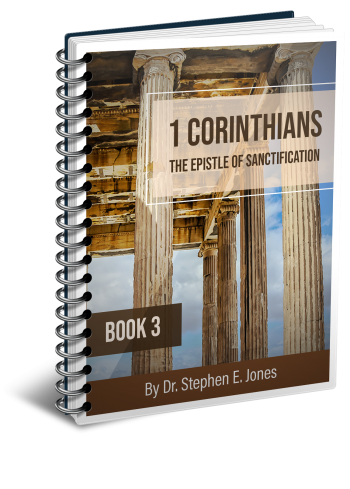Latest Posts
View the latest posts in an easy-to-read list format, with filtering options.

An in-depth commentary/study on chapters 12 and 13 of First Corinthians.
Category - Bible Commentaries

In 1 Cor. 12:9 Paul lists “faith” as the third spiritual gift, saying, “to another faith by the same Spirit.” Paul implies that faith (as a gift of the Spirit) is not necessarily given to all believers, but “to another.” We know, of course, that basic faith is necessary for justification, for we are “justified by faith” (Rom. 3:28; 5:1).
Further, “faith comes by hearing” (Rom. 10:17), which means that no one has faith apart from hearing the inner voice of God. Hence, even justifying faith is a gift from God, for God must speak before a man can hear and respond.
Yet faith as a spiritual gift goes beyond justifying faith. Justifying faith is a Passover experience, whereas the gift of faith is a Pentecostal experience. Hence, there is more than one level of faith that God has given to us. We see this reflected in Paul’s statement in Rom. 1:17,
17 For in it the righteousness of God is revealed from faith to faith, as it is written, “But the righteous man shall live by faith.”
We should understand this to mean that the righteousness of God is revealed, layer by layer, from Passover faith to Pentecostal faith—and, by extension, to Tabernacles faith. Israel heard the word and kept the Passover by faith. Hence, they were able to come out of Egypt and be called “the church in the wilderness” (Acts 7:38 KJV). But when they came to Mount Horeb and refused to hear God’s voice (Exodus 20:18-21), they failed to increase their faith to the level of Pentecost.
Their faith, then, was limited. Their faith was sufficient for them to be called “the church,” but it was not sufficient to be called an overcomer. For this reason, Heb. 3:19 tells us, they were unable to enter the Promised Land “because of unbelief”—that is, their lack of faith. The implied warning is that we need true Pentecostal faith in order to get to the Promised Land.
So we read the warning in Hebrews 4:1,
1 Therefore, let us fear lest, while a promise remains of entering His rest, any one of you should seem to have come short of it.
The Hebrew word for faith is aman, which is to be faithful. It is the root of emeth, which means “truth.” Since faith comes by hearing, genuine faith comes by hearing truth. One is not saved by hearing a lie, for lies come from the world—not from God. So once again we must consider the source of that which we believe to be true.
When we hear and respond to the word of God, genuine faith is evident. Many have “faith” in other gods or prophets, but such “faith” has no power to justify or to save. Justifying faith comes only by hearing the voice of God. True hearing is evident when a person believes that the word is true. So Psalm 119:142 says, “Your law is truth” (emeth). In Psalm 119:151 we read, “all Your commandments are truth.” In fact, Psalm 119:160 says, “the sum of Your word is truth.”
Herein lies a problem, for not all believers in the church truly believe this. Their belief is mixed with unbelief. Some, for instance, reject the law. Others reject the gifts of the Spirit. In other words, their faith is partial. To put it another way, their faithfulness to the truth is flawed.
It is precisely for this reason that faith has more than one layer. By definition, all believers have faith on a Passover level, for if they do not believe that the blood of Jesus Christ has the power to cleanse from sin, they are not even Christians. But not all believers have increased their level of faith to a Pentecostal level, where they are willing to hear the voice of God as He speaks His Commandments.
Even those who call themselves Pentecostal often reject the law, thinking it is carnal, and so very little of the law is written on their hearts (Heb. 8:10). God offered to write His law upon the hearts of Israel in the time of Moses, but they refused. Hence, God gave the law to Moses—who was willing to hear—and he inscribed it on tables of stone. The rest of the law probably was written on paper (Egyptian papyrus) or on copper plates.
The point is that the law remained external under the Old Covenant, unless the people developed spiritual ears by which they could hear and believe the promises of God under the New Covenant.
The gift of faith, then, which comes by hearing the truth that is inherent in the divine law, is transferred from external tablets, plates, or paper to the tablets of the heart. When the law is written upon the heart, a person begins to take on the nature of Christ. No longer does he have to obey an external word being imposed upon an unwilling heart; he does the works of Christ by nature—not by compulsion. He goes beyond obedience into agreement.
This is possible only through the gift of faith.
Agreement is bound up in the word amen, which is derived from the Hebrew word aman. The Hebrew word amen means “truly, verily, so be it.” It is expressed in the New Testament (KJV) as “verily, verily,” or, as some render it, “truly, truly.” It is the Greek way of saying, “amen, amen” (Neh. 8:6), and it always signifies agreement.
Yet even Pentecostal faith is not the highest form of faith, for it is a time of growth and learning. Pentecost is thus a leavened feast (Lev. 23:17) in need of the baptism of fire to stop the leavening action. Pentecost is the feast of the wilderness. The feast of Tabernacles is the goal of Pentecost, signifying one’s entrance into the Promised Land. Hence, Pentecost is a time where we are still learning obedience until such time as we come into full agreement.
We can measure our own hearts by asking ourselves whether we agree with His law, or merely comply with His commands as we are led by the Spirit. Whenever we must submit our own will to the will of God, it shows that the two wills remain in disagreement and so we are still in obedience training.
When a person first begins to submit his/her rebellious will to the law of God, much grumbling takes place. We submit, but we go “kicking and screaming.” When we arrive at the place where God’s commands are what we would do naturally and joyfully, then can it be said that we are in agreement.
That is the highest level of faith.